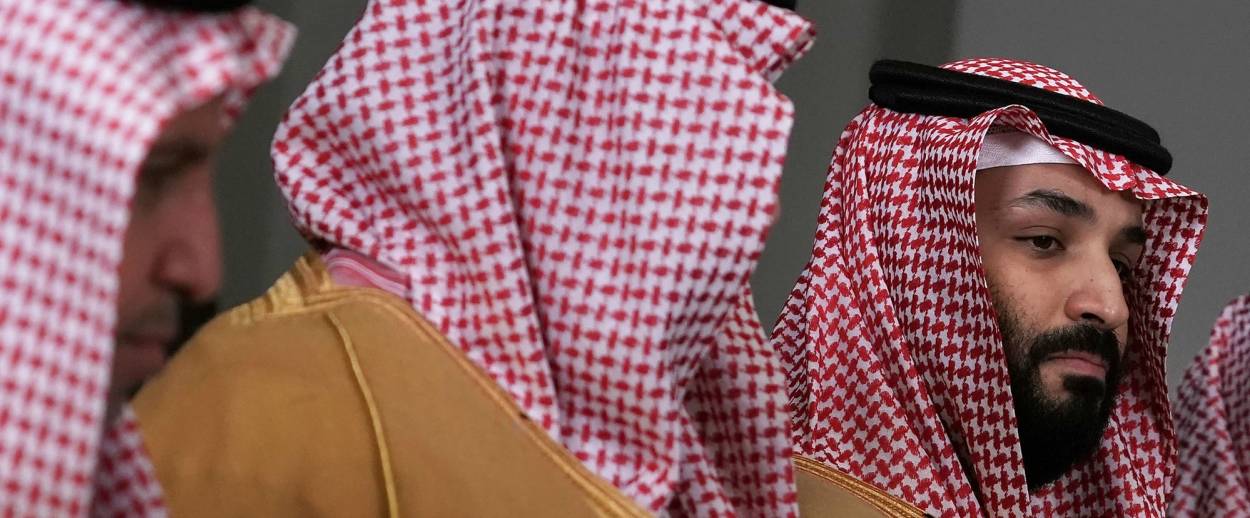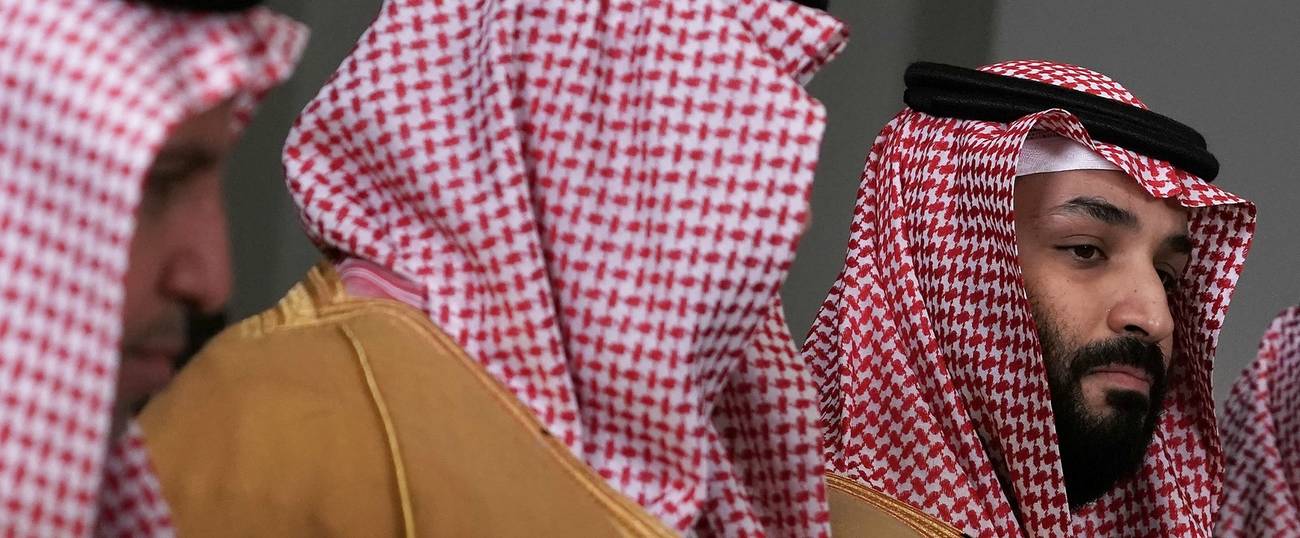The Secret to Successful Arab Modernization is to Stop Hating Israel
Saudi Arabia’s main reason to normalize relations with the Jewish state is not strategic but sociological




In the middle of Mohammed bin Salman’s two-week trip across America seeking investment and advice, from tech innovators in Palo Alto to New York rabbis, for his blueprint for his country’s future, the Crown Prince of Saudi Arabia made news—maybe history. In an interview with the Atlantic Magazine’s Jeffrey Goldberg publishedMonday, the man known as MBS said that he personally recognized the legitimacy of Zionism.
“I believe that each people, anywhere, has a right to live in their peaceful nation,” said the Saudi royal. “I believe the Palestinians and the Israelis have the right to have their own land. But we have to have a peace agreement to assure the stability for everyone and to have normal relations.”
In 1919, Emir Faisal, ruler of the Kingdom of Hejaz, signed a famous agreement with the Zionist leader Chaim Weizmann recognizing a Jewish State in a future Arab sphere of influence that would be free of Ottoman and Western colonial rule. Yet ever since MBS’s grandfather Ibn Saud founded the modern Saudi kingdom in 1932, Riyadh has opposed a Jewish state in the Middle East. Some of MBS’s predecessors were more active than others in their opposition. In the early 2000s, for instance, Riyadh covered much of Hamas’ budget and supported other extremist groups committed to the destruction of Israel.
There have also been peace overtures, like the initiative that MBS’s uncle Abdullah, then Crown Prince himself and later King, made public in a February, 17, 2002 Thomas Friedman column. Abdullah’s proposal offered Israel “full normalization of relations” in exchange for withdrawal from “all the occupied lands.” But MBS’s statement leapfrogs Abdullah’s initiative. He has validated the central tenet of Zionism—the Jews have a right to their own land. In the Middle East.
Now when he gets back to Riyadh, the Crown Prince should move for open and normal relations—not because of Israel or the Palestinians or Muslims more generally, or for the sake of world peace, but for his own people.
Perhaps it’s because the 32-year-old Arab leader has already broken so many taboos that reports of this history-making statement have been muted. It’s certainly gotten less attention than when MBS detained some 200 officials for several months starting in November. Among those held at the Ritz in a huge corruption purge were several princes, including Waleed bin Talal, one of the world’s wealthiest men. That is, MBS was calling his own family, the royal family, to account.
While many commentators argued the corruption purge was simply cover for a power grab, MBS is already the power behind the throne he is destined to inherit from his father, the 82-year-old King Salman bin Abdulaziz. The real point was that in jailing his own blood, MBS showed that no one is above the law. The royal family, the custodians of Islam’s two holy shrines in Mecca and Medina, is not itself sacred. Rather, it’s an imperfect institution that should be held accountable, like everyone else.
Thus MBS established the precedent by which he too will be judged by those he leads—men as well as women, whom he seeks to make a full part of this conservative country’s society and economy. According to sources in the region, MBS has further pushed against tradition, though much less publicly, in urging religious officials to reform certain Islamic texts that preach violence and hostility to non-Muslims. He told Thomas Friedman in November that the kingdom is not “reinterpreting” Islam but “restoring” it to its origins. On MBS’s reading, it all started to go wrong in 1979, when armed extremists took over the grand mosque in Mecca, the Soviets invaded Afghanistan, and the Islamic Revolution took root in Iran.
If Middle East and Islam experts tend to roll their eyes with talk of a pre-1979 Saudi Arabia that sounds a little like Sweden, the reality is that he’s written a new foundation story for the vast majority of a population born after 1979. Another thing Saudi youth don’t remember is the last full-on Arab Israeli war in 1973, or the economic embargo MBS’s uncles imposed on the US for supporting Israel. His grand reform project, known as Vision 2030, is a clear warning to his countrymen that Saudi Arabia can no longer exist on oil receipts alone. Nor, as his statement on Israel shows, can Riyadh allow its foreign policy to be held hostage by other regional actors
The Saudis have been embroiled in a regional squabble with their Gulf Cooperation Council neighbor Qatar for close to a year now. Riyadh has imposed an embargo on Doha until it stops promoting and funding extremists, interfering with Saudi’s internal politics, and flirting with Iran. The Saudi effort is ham-fisted, but MBS wants his neighbors in line to counter the Iranian threat. The Palestinians represent a more dangerous breach than Qatar.
The Hamas-fueled protests—attacks —on the Gaza border are partly intended to deflect attention as the Trump administration prepares for the possibility of withdrawing from the Iran nuclear deal in mid-May. Iran’s strategy is to sow divisions in the US alliance system by highlighting Saudi Arabia’s budding, albeit quiet, relationship with the Palestinians’ adversary, Israel. If in sending children to the border Hamas is trying to force the Saudis to choose between the Palestinians and Israel, MBS deflected the issue Monday, explaining that both have rights.
But the main reason to normalize relations with the Jewish state is not strategic—rather, it’s sociological.
In the Atlantic interview and elsewhere, MBS has compared Iran’s Supreme Leader to Hitler. Ali Khamenei, the prince said, “is the Hitler of the Middle East. In the 1920s and 1930s, no one saw Hitler as a danger. Only a few people. Until it happened. We don’t want to see what happened in Europe happen in the Middle East. We want to stop this through political moves, economic moves, intelligence moves. We want to avoid war.”
While Hitler comparisons are rarely advisable, MBS’s analogy underscores the fact that he sees the nature of the Iranian region very differently than another world leader Jeffrey Goldberg interviewed, several times in fact—former President Barack Obama. Shortly after the Obama White House struck the nuclear agreement with Iran in July 2015, Goldberg pressed Obama on the Iranian regime’s anti-Semitism. Obama saw it as functional.
“The fact that you are anti-Semitic, or racist, doesn’t preclude you from being interested in survival,” said Obama. “It doesn’t preclude you from being rational about the need to keep your economy afloat; it doesn’t preclude you from making strategic decisions about how you stay in power; and so the fact that the supreme leader is anti-Semitic doesn’t mean that this overrides all of his other considerations.”
It didn’t take impoverished Iranians protesting against the economy their leaders had pillaged to show that Obama was fundamentally wrong about the nature of the regime — and about one of the chief ideological weapons that it cultivates. Anti-Semitism and reason cannot exist side by side because anti-Semitism is the precise form that unreason takes in modern politics.
The criticism of anti-Semitism typically focuses on the damage that it does to Jews, but that’s only one part of the equation. The other concern is what it does to those who are afflicted by anti-Semitism, non-Jews, by turning them into stark raving lunatics who are incapable of understanding the world and thus acting in it rationally. If you believe that one percent of the world’s population controls global wealth, communications, and even the weather, it becomes increasingly difficult to function. When an entire society adopts this as a worldview, it’s over. “The Jews control the weather” is not a starting point from which anyone makes progress.
Consider Syria, for instance, whose rulers thought it advisable to bind competing sects and tribes together in an oppositional nationalism based on perpetual war against the Jewish state. It was nearly inevitable that at some point Syrians would turn to slaughtering each other. Iran’s anti-Semitism is dangerous for Israel but let’s be frank—Jerusalem has a large nuclear arsenal and can take care of itself even if its superpower patron in Washington blinks. The anti-Semitism that is the signature of the Iranian leadership’s madness is much more dangerous to Iran itself—a peril further magnified by the regime’s pursuit of nuclear weapons.
Thus, the Iranian threat isn’t just military, but is also cultural. That’s why MBS is in a rush to undo the post-1979 regional order, represented now by the obscurantist regime in Tehran that courts war not simply with Israel, but with all of its neighbors, from the Persian Gulf to the eastern Mediterranean. To keep Saudi Arabia moving headlong in the other direction, the future, the logical move for a man who keeps shocking the system is to embrace Israel. By establishing normal relations with the Jewish state, MBS would be enshrining his vision for a normal Saudi Arabia.
Lee Smith is the author of The Permanent Coup: How Enemies Foreign and Domestic Targeted the American President (2020).